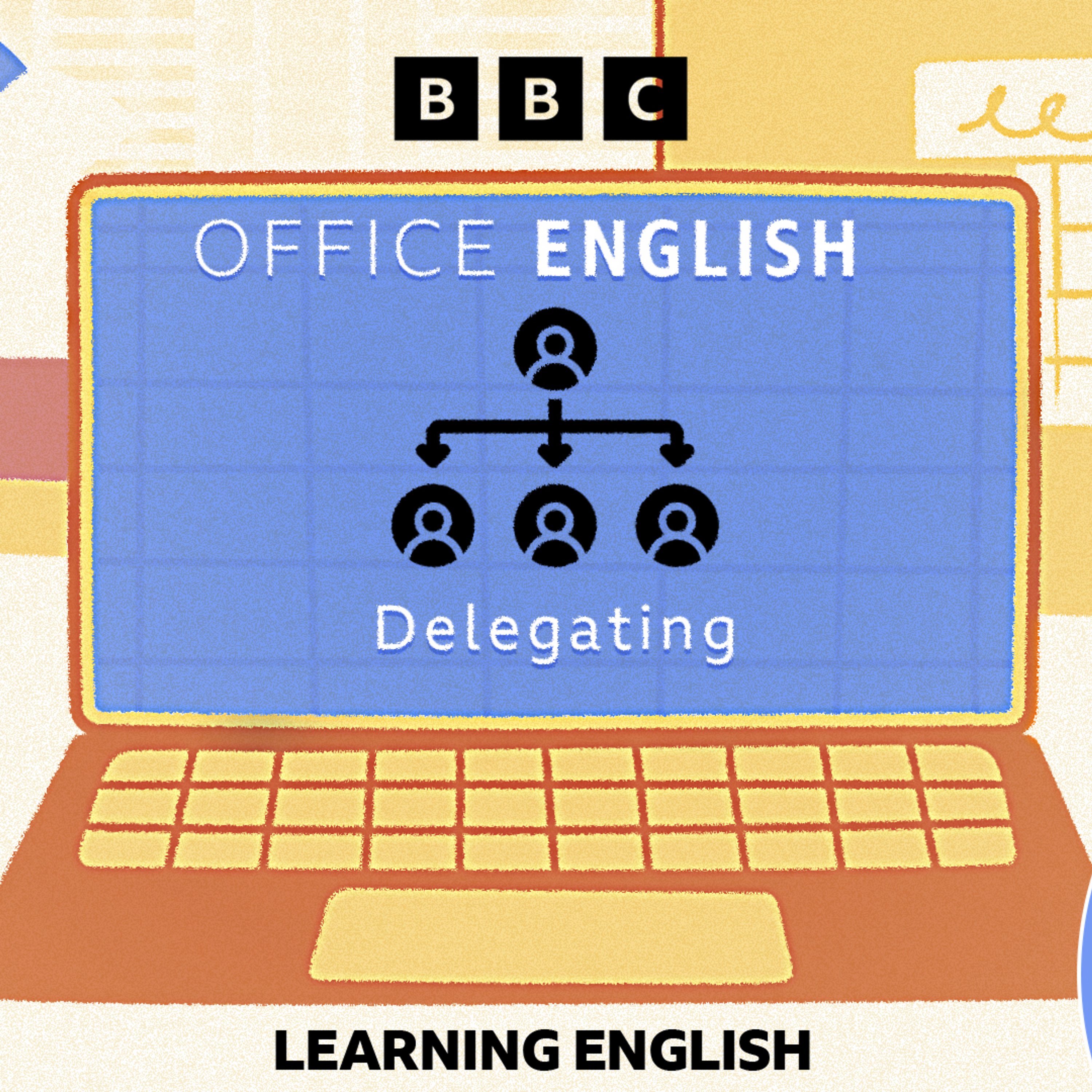
Deep Dive
- Difficulty in delegating tasks stems from personal preferences and a desire for control.
- The speaker admits to being a control freak and preferring to handle tasks independently.
- Working independently is a habit that makes delegating challenging when workload increases.
Shownotes Transcript
Do you let people help you at work or are you a bit of a control freak? If it's something I feel strongly about and I have a very fixed idea of how I want it to happen, then it can be difficult to delegate.
But generally, I think the more people involved, the better. And if people can help, then I'm very happy for them to, you know, do some of the tasks. Generally, if I've got a lot of people to work with, I think the more the merrier. You can produce an excellent group effort, I think. Today on Office English, we're talking about delegating and giving other people instructions.
Hello and welcome to Office English, your podcast guide to the world of work. I'm Pippa. And I'm Phil. You can read along with this podcast on our website. Visit bbclearningenglish.com. Today's episode is all about delegating. So, what's delegating, Phil, and do you find it easy to delegate? Ooh.
No, I don't. Delegating is when you give someone else something that you're doing to do, or you ask someone to do some of your work. Yeah, I'm not very good at it. I try and do it all myself quite often. Yeah, I think I'm often used to working on my own. And so when I then need to delegate, I've got too much to do. I find it a bit difficult to do that. I'm a bit of a control freak, I think.
Also, sometimes you feel like it would take so long to tell someone else how to do it that I might as well have just done it myself, which is probably not the right way to think, but it's sometimes what I think. Of course, but we're not managers and I think that might be a big thing here. So today we'll talk about when and what to delegate and how you can be polite and clear when you give someone else instructions at work. Let's start with what to delegate.
Let's imagine you're working on a project and suddenly things become very busy and there's too much for you to do. Your boss decides that another member of your team will help you on the project and asks you to delegate some tasks to them. Where do you start?
Good question, Phil. I think this is where you have to try and sort out your different tasks and what could somebody help you with. So I always think about a few different questions. So what's urgent? What needs to be done now? What's important that it's done in a certain way? So what maybe do I need to do?
And then also what's easy to explain or what's easy for the other person to do. So you probably don't want to give them all of the difficult tasks, all of the boring tasks, and you do all the fun ones. So yeah, what's urgent, what's important, what's easy to explain. That's how I think about it. I think that's the really important one, actually. How easy is it to explain? Because as you said earlier, there are some things that actually can take longer to explain than to do. So there's probably...
I don't know how much time you save by delegating those, but other things are just really easy or people don't need a lot of background. Some tasks, maybe you need to know a lot of what is going on before it makes sense. Whereas other tasks are quite easy to, okay, it's just this, it's quite independent. You do this, you do this, it's done. If you're not a manager, if you're not someone who has to kind of sort through these tasks, I think it's really difficult to manage.
initially when you look at a project work out what are the right things to delegate so yeah what's urgent what's important what's easy to explain okay so we've worked out what to delegate now we need to do the delegating how would you do this well there's a couple of ways you could talk about different tasks we could use indirect language or we could use direct language
So indirect language is quite common in British English in British workplaces. So I might say something like, would you mind helping me with and then talk about the tasks? Or could you give me a hand with and then explain? So it's kind of strange because they have been asked by the boss to help you. But I would probably use those polite phrases rather than kind of becoming all bossy myself. I think I'm the same. I think this might be a very English way of doing it.
Yeah, there are some ways you could do it more directly. These, to me, sound more like what a manager would say. Like, I'm making you responsible for, or I'm handing this over to you. They're quite direct. And as I say, I think our work culture is often quite indirect. So I'm not sure I would feel comfortable just saying that to my colleagues. Yeah.
If I was a manager, I probably would because they're expecting me to do that. Another indirect phrase I might say is, oh, I'm going to give this to you to do. Is that OK? So just like you can be quite direct, but then asking, is that OK? It makes it more polite. So you can easily kind of switch from the two or mix the two. Yes. Yes.
So a lot of people find it difficult to delegate because they think telling someone else how to do something, as we mentioned, would take just as long as doing it. Or they just worry that the other person might not do things in the right way and do things how they would do them.
Yeah, so it's all about giving clear instructions. Let's listen to our BBC colleagues, Sian and George again. Yeah, giving concrete examples, perhaps showing some examples of work that you've done before to give people a clear idea of what they're supposed to do. I guess giving them a chance to ask questions in case they, you know, want anything clarifying and maybe check in they've understood by asking them questions.
So Sian and George talked about using examples to help when you're giving instructions at work.
Yes, and they also mentioned checking that the person you're delegating to understands. Yes, so let's talk about some language that we can use to do this politely. So if you were talking about an example, you could say, here's a template for the spreadsheet. Let me know if everything makes sense to you. So you're telling them about an example and then you're giving them a chance to kind of question or ask any questions they have. Yeah, and if you want to show someone how you do something, you might just say,
Say something like, I usually make notes like this. Give me a shout if you have any questions. That just means ask me if you've got any questions. Another way you could explain something, you could be more direct and say, could you follow this process? So you're not really giving them an option. But if you have any difficulties, just ask. So again, you're giving them a chance to kind of say if they don't understand the instructions.
It's hard because sometimes you feel awkward with a colleague telling them how to do something. So those kind of phrases make it all quite polite, quite friendly. And also that you're not kind of treating them like they're an idiot and they don't understand how to do anything. Yeah.
That's it for this episode of Office English. You can find more programmes to help you with your English at work on our website bbclearningenglish.com. Next time we'll talk about what to do and say when you don't understand something at work. See you then. Bye.
Thanks for listening to Learning English for Work. Did you know we have a BBC Learning English email newsletter? Subscribe for our latest lessons, worksheets and quizzes and weekly tips to help you study. Just search BBC Learning English newsletter or follow the link in the notes for this programme.
